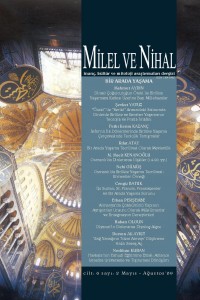Abstract
As is well known the issue of living together with “the other” has been started to be one of the most important problem from the beginning of the humanity especially from the controversy between Cain and Abel whose story is told by both the Bible and the Qur’an. This problem both has been getting very complicated and being an existential problem in our own day. Furthermore our contemporary intercommunicating and interdependent universe has made us aware, more clearly but also more painfully than ever before, of the multiplicity of different religions and cultures. Thus the presence, power and richness of the others have vigorously entered our own awareness. Because of these developments the issue of living together with the other has become an important problem which we need to overcome by developing new models which urge us to be more tolerant to others by accepting them as they accept themselves and respecting their otherness. In this article it is dealt with the possible contribution of pluralistic model which has been developed in Wester academies and spreaded all over the world as a response to present religious and cultural diversity of our world. By doing this our main thesis is to present the reader’s attention the following point: As long as a religiously pluralistic world view does not become widespread all over the world it is not possible to take root of the political, social and cultural pluralism in order to establish a world order in which all sides both can live together by establishing on the one hand a common value and harmonious society and on the other hand keep their own distinctive features.
Abstract
İnsanlık tarihinin başlangıcından özellikle de Eski Ahit ve Kur’an’da kıssası anlatılan Habil-Kabil olayından beri bir “insanlık problemi” olan birlikte yaşama sorunu, günümüz dünyasında hem karmaşık bir hal almış hem de varoluşsal bir sorun haline gelmiştir. Birlikte yaşama sorununun üstesinden gelip tüm kesimlerin kendi ayırt edici farklılıklarını muhafaza ederek birlikte barış içinde yaşamasını sağlamak için artık ciddi olarak bir şeyler yapmak ve modeller üretmek zorunda olduğumuz bir gerçektir. Bu yazıda hem dünyamızın mevcut dinsel çeşitliliğine bir yanıt, hem de dinler ve kültürlerarası ilişkileri geliştirmek için ilkin batı akademilerinde geliştirilen ve oradan da dünya ölçeğinde tartışma konusu olan dinsel çoğulculuk modeli ekseninde birlikte yaşamanın teolojik temelleri üzerinde durularak dinsel çoğulculuk modelinin birlikte yaşamaya katkısı tartışma konusu yapılacaktır. Bunu yaparken temel tezimiz, dini açıdan çoğulcu bir dünya görüşü yaygınlaşıp egemen olmadıkça siyasi, sosyal ve kültürel çoğulculuğun tam olarak kök salması ve buna paralel olarak farklı din ve kültür mensuplarının kendi ayırt edici farklılıklarını muhafaza ederek ortak bir değere üretmek suretiyle barış içinde birlikte yaşamasının oldukça güç olduğunu ortaya koymak olacaktır.
Details
| Primary Language | Turkish |
|---|---|
| Journal Section | Articles |
| Authors | |
| Publication Date | June 1, 2009 |
| Submission Date | November 5, 2014 |
| Published in Issue | Year 2009 Volume: 6 Issue: 2 |


